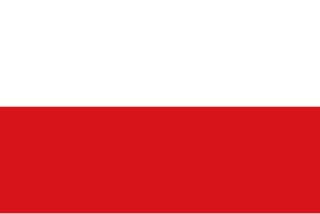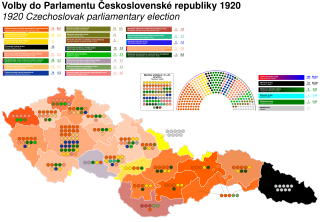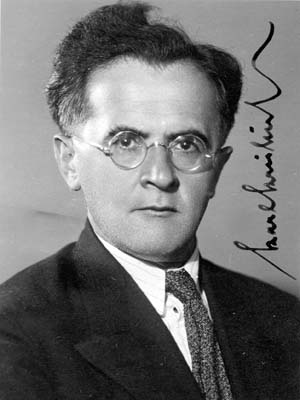Related Research Articles

Czechoslovakia was a landlocked state in Central Europe, created in 1918, when it declared its independence from Austria-Hungary. In 1938, after the Munich Agreement, the Sudetenland became part of Nazi Germany, while the country lost further territories to Hungary and Poland. Between 1939 and 1945, the state ceased to exist, as Slovakia proclaimed its independence and Carpathian Ruthenia became part of Hungary, while in the remainder of the Czech Lands, the German Protectorate of Bohemia and Moravia was proclaimed. In 1939, after the outbreak of World War II, former Czechoslovak President Edvard Beneš formed a government-in-exile and sought recognition from the Allies.
With the collapse of the Habsburg monarchy at the end of World War I, the independent country of Czechoslovakia was formed as a result of the critical intervention of U.S. President Woodrow Wilson, among others.
Carpathian Ruthenia is a historical region on the border between Central and Eastern Europe, mostly located in western Ukraine's Zakarpattia Oblast, with smaller parts in eastern Slovakia and the Lemko Region in Poland.

Gustáv Husák was a Czechoslovak politician who served as the long-time First Secretary of the Communist Party of Czechoslovakia from 1969 to 1987 and the President of Czechoslovakia from 1975 to 1989.

The Czechoslovak Socialist Republic, known from 1948 to 1960 as the Czechoslovak Republic or Fourth Czechoslovak Republic, was the Czechoslovak state from 1948 until 1989, when the country was under communist rule, and was regarded as a satellite state in the Soviet sphere of interest.

Elek Köblös was an Austro-Hungarian-born Hungarian and Romanian communist activist and political leader. He was also known by the pseudonyms Balthazar, Bădulescu, and Dănilă. He served as general secretary of the Romanian Communist Party from 1924 to 1927 and was executed in the Soviet Union during the Great Purge.

The First Czechoslovak Republic, often colloquially referred to as the First Republic, was the first Czechoslovak state that existed from 1918 to 1938, a union of ethnic Czechs and Slovaks. The country was commonly called Czechoslovakia, a compound of Czech and Slovak; which gradually became the most widely used name for its successor states. It was composed of former territories of Austria-Hungary, inheriting different systems of administration from the formerly Austrian and Hungarian territories.

Parliamentary elections were held in Czechoslovakia on 18 and 25 April 1920. Members of the Chamber of Deputies were elected on 18 April and members of the Senate on 25 April. The elections had initially been planned for mid- or late 1919, but had been postponed.

On 20–21 August 1968, the Czechoslovak Socialist Republic was jointly invaded by four Warsaw Pact countries: the Soviet Union, the Polish People's Republic, the People's Republic of Bulgaria and the Hungarian People's Republic. The invasion stopped Alexander Dubček's Prague Spring liberalisation reforms and strengthened the authoritarian wing of the Communist Party of Czechoslovakia (KSČ).

The Marxist Left in Slovakia and the Transcarpathian Ukraine was a political organisation in eastern parts of the First Czechoslovak Republic. It was one of the forerunners of the Communist Party of Czechoslovakia.

Parliamentary elections were held in Czechoslovakia on 27 October 1929. The Republican Party of Farmers and Peasants, emerged as the largest party, winning 46 seats in the Chamber of Deputies and 24 seats in the Senate. Voter turnout was 90.2% in the Chamber election and 78.8% for the Senate. The rightward shift of the 1925 elections was reversed, with moderate centre-left groups increasing their vote shares whilst the Communist Party suffered a set-back.

Gertruda Sekaninová-Čakrtová, born Stiassny was a Czech and Czechoslovak lawyer, politician and diplomat of Jewish origin, later also a dissident and signatory of the Charter 77. She is most renowned for being one of the four deputies of the National Assembly of the Czechoslovak Socialist Republic who voted against the agreement on the temporary stay of Soviet troops in Czechoslovakia in the fall of 1968, following the Warsaw Pact invasion of Czechoslovakia.

The Užhorod electoral district was a parliamentary constituency in Czechoslovakia for elections to the Chamber of Deputies and the Senate. The constituency covered all of Subcarpathian Ruthenia. The electoral district elected nine deputies in all elections held in the constituency during the First Czechoslovak Republic. The numbers of electors per each parliamentary seat was the highest in the Užhorod compared to all other electoral districts.

Elections for deputies to the Czechoslovak parliament from the Užhorod electoral district were held on 16 March 1924. Nine members of the Chamber of Deputies and four senators were elected.

Parliamentary elections in the First Czechoslovak Republic were held in 1920, 1925, 1929 and 1935. The Czechoslovak National Assembly consisted of two chambers, the Chamber of Deputies and the Senate, both elected through universal suffrage. During the First Republic, many political parties struggled for political influence and only once did a single party muster a quarter of the national vote. Parties were generally set up along ethnic lines.

The Nové Zámky 16th electoral district was a parliamentary constituency in the First Czechoslovak Republic for elections to the Chamber of Deputies. The seat of the District Electoral Commission was in the town of Nové Zámky. The constituency elected 11 members of the Chamber of Deputies.

The Košice 20th electoral district was a parliamentary constituency in the First Czechoslovak Republic for elections to the Chamber of Deputies. The seat of the District Electoral Commission was in the town of Košice. The constituency elected 7 members of the Chamber of Deputies.

Karl Kreibich, also known as Karel Kreibich, was a Sudeten German communist politician and author in Czechoslovakia. Kreibich emerged as the main leader of the revolutionary socialist movement amongst German workers in Bohemia after the First World War. He was a leader of the Communist Party of Czechoslovakia and a functionary of the Communist International. During the First Czechoslovak Republic, he was elected to parliament thrice. During the Second World War he was part of the exiled Czechoslovak State Council, based in London. After the war he served as Czechoslovak ambassador to the Soviet Union.
The International Socialist Party of Subcarpathian Rus' was a political party in Subcarpathian Rus', eastern Czechoslovakia. The party was formed in March 1920, by supporters of the now defeated Hungarian Soviet Republic and prisoners of war having returned from Soviet Russia. The party was one of the forerunners of the Communist Party of Czechoslovakia.
Ivan Ivanovych Turyanytsia was a Czechoslovak, Ukrainian and Soviet politician, who served as the chairman of the People's Council of Zakarpattia Ukraine from 1944 to 1946 and the First secretary of the Communist Party of Zakarpattia Ukraine.
References
- 1 2 3 Poslanecká sněmovna. Ivan Mondok
- ↑ Joshua A. Fishman (3 May 2011). The Earliest Stage of Language Planning: "The First Congress" Phenomenon. Walter de Gruyter. p. 298. ISBN 978-3-11-084898-4.
- 1 2 3 4 5 6 7 8 9 10 11 Milorad M. Drachkovitch (1973). Biographical Dictionary of the Comintern. Hoover Press. p. 323. ISBN 978-0-8179-8403-8.
- ↑ Иван Кремпа (1979). За интернациональное единство революционного рабочего движения Чехословакии. Наука. pp. 55–59.
- ↑ Poslanecká sněmovna. Ivan Mondok
- 1 2 České země a moderní dějiny Evropy: studie k dějinám 19. a 20. století. Historickẏ ústav AV. 2010. p. 127. ISBN 9788072861651.